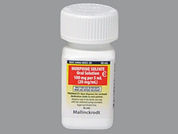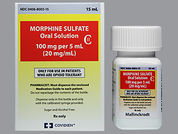Morphine Sulfate
Morphine Sulfate
What is Morphine Sulfate used for?
This medication is used to help relieve moderate to severe pain. Morphine belongs to a class of drugs known as opioid analgesics. It works in the brain to change how your body feels and responds to pain.
CHEMICAL NAME
DRUG TYPE
Pain/InflammationMorphine Sulfate Prices
Searching for the lowest prices
Morphine Sulfate Frequently Asked Questions
If someone has overdosed and has serious symptoms such as passing out or trouble breathing, give them naloxone or nalmefene if available, then call 911. If the person is awake and has no symptoms, call a poison control center right away. US residents can call 1-800-222-1222. Canada residents can call 1-844-764-7669. Symptoms of overdose may include: slow/shallow breathing, slow heartbeat, coma.
IMPORTANT: HOW TO USE THIS INFORMATION: This is a summary and does NOT have all possible information about this product. This information does not assure that this product is safe, effective, or appropriate for you. This information is not individual medical advice and does not substitute for the advice of your health care professional. Always ask your health care professional for complete information about this product and your specific health needs.



